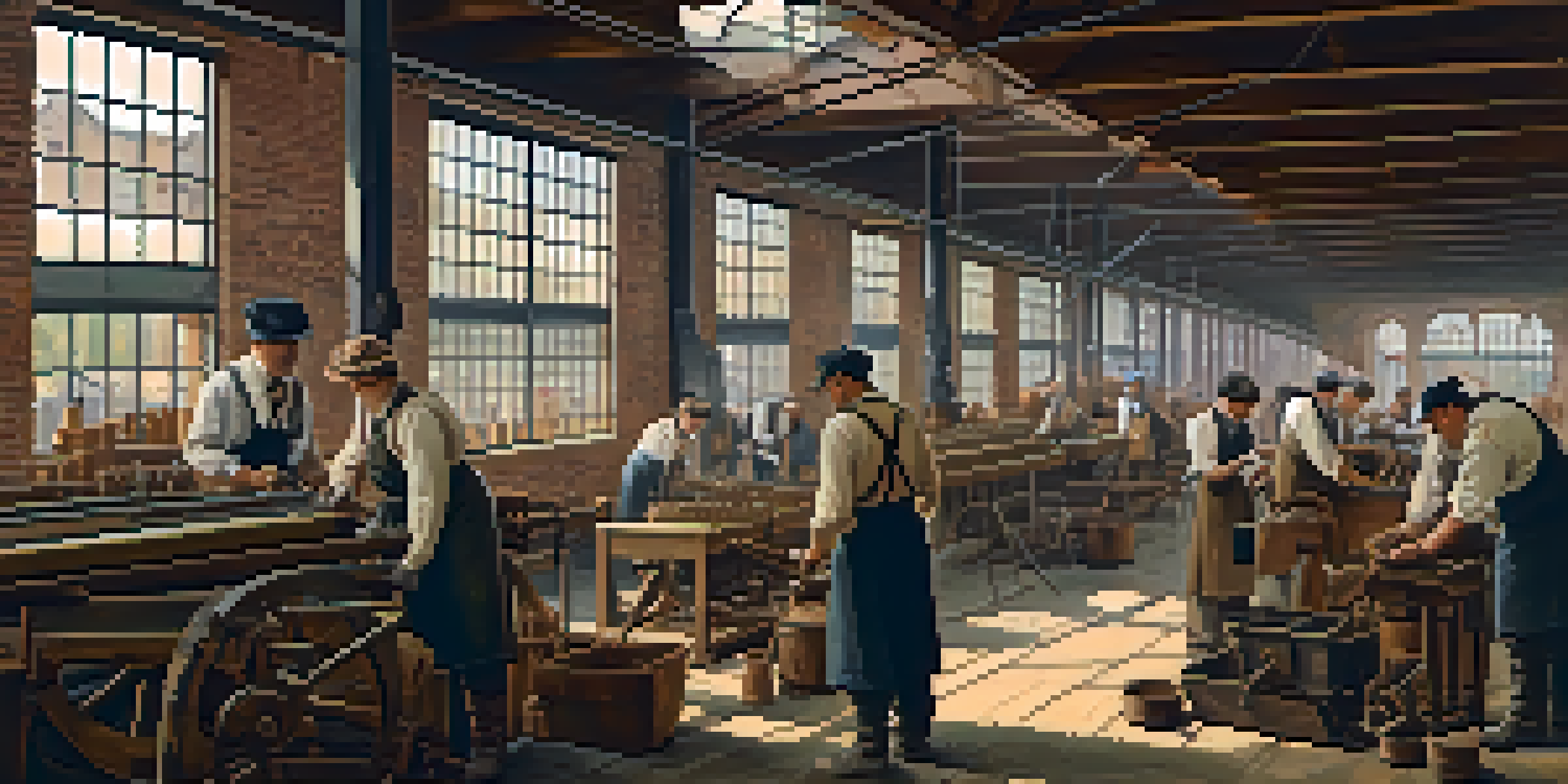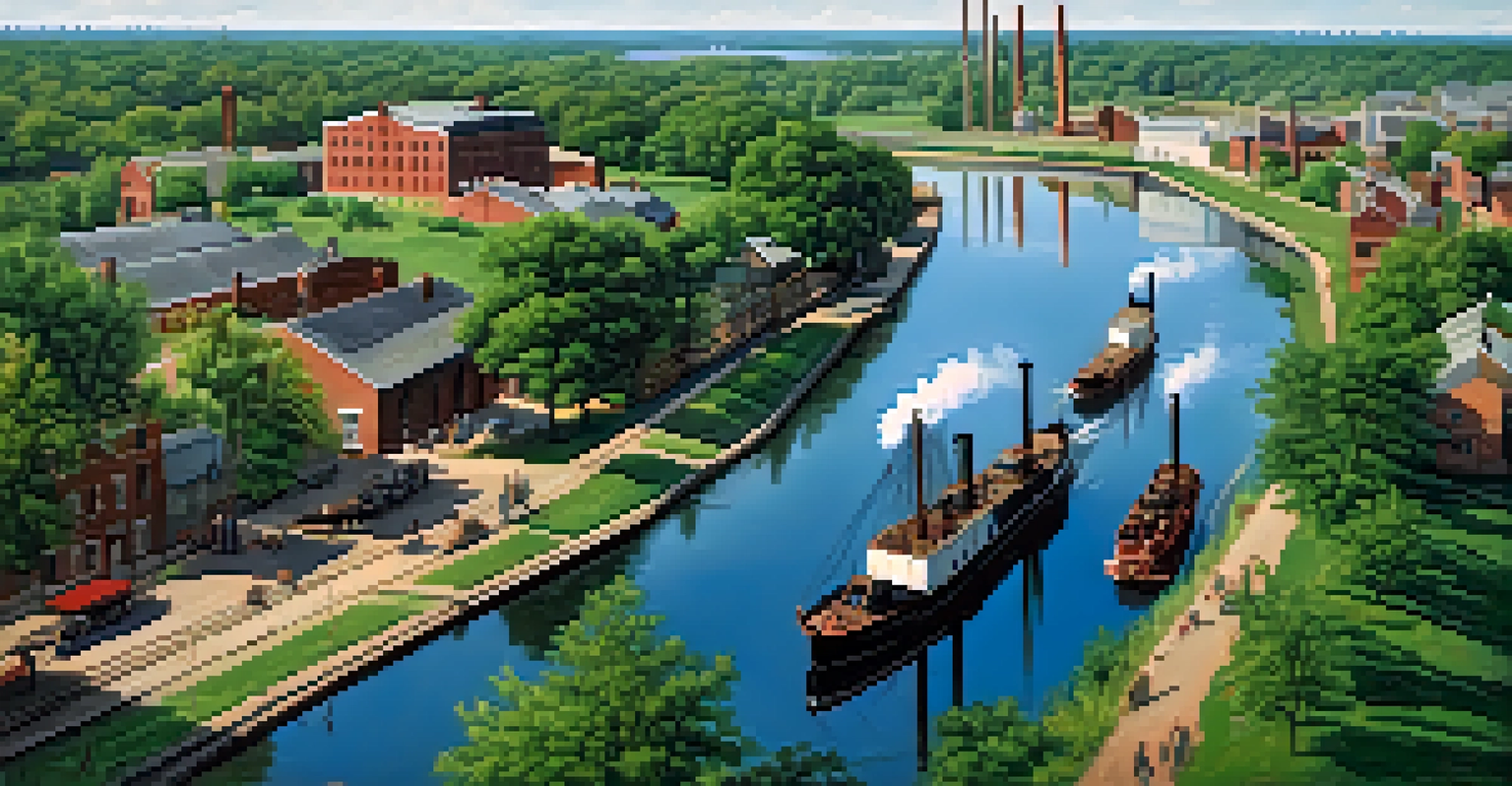New Jersey's Industrialization: Transforming the American Landscape

The Dawn of Industrialization in New Jersey
In the early 19th century, New Jersey began its journey toward industrialization, fueled by the rise of mechanized production. This shift marked a significant departure from the agrarian lifestyle that had dominated the state. Towns like Paterson emerged as manufacturing hubs, showcasing the potential of water-powered mills.
Industry is the engine of economic growth, propelling communities towards prosperity and innovation.
The state's strategic location between major cities like New York and Philadelphia made it an ideal spot for industry to flourish. Transportation networks, including roads and railroads, were developed to support the growing economy. These advancements not only boosted local job opportunities but also attracted immigrants seeking a better life.
As factories sprang up, so did the challenges of urbanization. The influx of workers led to crowded living conditions, prompting the need for social reforms. Nevertheless, New Jersey's industrial beginnings laid the groundwork for a robust economy that would shape the future.
Key Industries Driving New Jersey's Growth
New Jersey became synonymous with various industries that contributed to its economic boom. Textile production, particularly in cities like Paterson, was a cornerstone of the state's early industrial landscape. The abundance of water power from rivers provided the energy needed to operate these mills efficiently.

Beyond textiles, the state also became a leader in pharmaceuticals and chemicals. Companies like Johnson & Johnson and Merck established their roots here, revolutionizing healthcare and medical practices. These industries not only created jobs but also positioned New Jersey as a center for innovation.
Industrialization Transformed New Jersey
The shift from agrarian lifestyles to industrialization in the early 19th century laid the foundation for New Jersey's economic growth.
The diversification of industries helped stabilize the economy during downturns. While some sectors faced challenges, others thrived, ensuring a resilient economic environment. This adaptability has allowed New Jersey to remain a vital player in the American industrial landscape.
Transportation Innovations That Changed Everything
Transportation played a crucial role in New Jersey's industrial transformation. The construction of railroads in the mid-19th century connected factories to markets, facilitating the movement of goods. This network not only improved efficiency but also reduced costs for manufacturers.
Labor is the superior of capital, and deserves much the higher consideration.
In addition to railroads, the growth of canals and later highways made it easier for industries to expand. The Delaware and Raritan Canal, for example, was instrumental in transporting raw materials and finished products. Such innovations helped New Jersey's industries thrive and become more competitive on a national scale.
As a result, cities grew around these transportation hubs, leading to increased urbanization. The ability to move goods quickly and efficiently contributed significantly to New Jersey's reputation as an industrial powerhouse, setting the stage for the modern economy.
The Impact of Immigration on New Jersey's Workforce
Immigration played a pivotal role in shaping New Jersey's industrial workforce. As factories expanded, the demand for labor surged, attracting waves of immigrants from Europe and beyond. These newcomers brought diverse skills and cultures, enriching the state's social fabric.
Many immigrants found employment in the booming industries, contributing to the production of textiles, machinery, and chemicals. Their hard work and dedication were instrumental in driving economic growth. However, they also faced challenges such as language barriers and difficult working conditions.
Immigration Shaped Workforce Diversity
The influx of immigrants during industrialization enriched New Jersey's labor market and contributed significantly to its manufacturing sectors.
Despite these hurdles, immigrant communities established vibrant neighborhoods, fostering a sense of belonging. This cultural melting pot has left a lasting legacy, influencing New Jersey's identity and contributing to its economic dynamism.
Labor Movements: Fighting for Workers' Rights
As industries flourished, so did the need for labor rights advocacy. Workers faced long hours, low wages, and unsafe conditions, prompting the rise of labor movements in New Jersey. These movements aimed to improve the lives of workers and secure fair treatment in the workplace.
Unions began to form, organizing strikes and protests to demand better working conditions and fair wages. The Pullman Strike of 1894, for example, highlighted the growing discontent among workers. Such actions not only drew attention to labor issues but also led to significant reforms over time.
The efforts of labor activists resulted in improved labor laws and workplace safety regulations. While the journey was fraught with challenges, these movements played a vital role in shaping modern labor standards, ensuring that workers' rights were prioritized in New Jersey and beyond.
Environmental Challenges of Rapid Industrialization
With industrial growth came significant environmental challenges that New Jersey had to confront. The rise of factories led to increased pollution, affecting air and water quality. Rivers that were once pristine became contaminated with industrial waste, sparking concerns among residents.
These environmental issues prompted public outcry and calls for reform. Activists began advocating for cleaner practices and more sustainable manufacturing processes. As awareness grew, the state took steps to implement regulations aimed at mitigating environmental damage.
Labor Movements Improved Worker Rights
Labor movements in New Jersey fought for better working conditions and fair wages, leading to significant reforms in labor laws.
Today, New Jersey continues to grapple with the legacy of its industrial past. However, the state has made strides towards sustainability, focusing on green technologies and restoration efforts. This ongoing journey reflects a commitment to balancing economic growth with environmental stewardship.
The Legacy of New Jersey's Industrial Revolution
The industrial revolution in New Jersey has left an indelible mark on the state and the nation as a whole. Its rich history of innovation and resilience has paved the way for modern industries. Today, New Jersey is home to a diverse economy that thrives on technology, pharmaceuticals, and manufacturing.
Moreover, the lessons learned from its industrial past continue to inform current practices. The emphasis on worker rights, environmental sustainability, and technological innovation reflects a commitment to progress. New Jersey’s industrial legacy serves as both a cautionary tale and a beacon of opportunity.

As we look to the future, New Jersey's ability to adapt and reinvent itself remains a testament to its enduring spirit. The state's industrial journey is not just a chapter in history; it's a roadmap for continued growth and transformation in an ever-changing world.